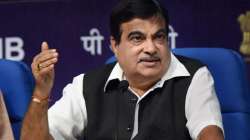The government will take a decision over flex-fuel engines in the next 8-10 days as it is considering making these engines mandatory for the automobile industry, Union minister Nitin Gadkari said on Sunday while asserting that the move will help farmers and boost the Indian economy. Addressing Rotary District Conference 2020-21 virtually, Gadkari said that the price of alternative fuel ethanol is Rs 60-62 per litre while petrol costs more than Rs 100 per litre in many parts of the country, so by using ethanol, Indians will save Rs 30-35 per litre.
"I am transport minister, I am going to issue an order to the industry, that only petrol engines will not be there, there will be flex-fuel engines, where there will be choice for the people that they can use 100 per cent crude oil or 100 per ethanol," he said.
"I am going to take a decision within 8-10 days and we will make it (flex-fuel engine) mandatory for the automobile industry," he further said.
The Road Transport and Highways Minister mentioned that automobile makers are producing flex-fuel engines in Brazil, Canada and the US providing an alternative to customers to use 100 per cent petrol or 100 per cent bio-ethanol.
Recently, Prime Minister Narendra Modi said the target date for achieving 20 per cent ethanol-blending with petrol has been advanced by five years to 2025 to cut pollution and reduce import dependence. The government last year had set a target of reaching 10 per cent ethanol blending in petrol by 2022 and 20 per cent doping by 2030.
Currently, about 8.5 per cent ethanol is mixed with petrol as against 1-1.5 per cent in 2014, Gadkari said adding ethanol procurement has risen from 38 crore litres to 320 crore litres.
Gadkari said that ethanol is a better fuel than petrol, and it is import substitute, cost effective, pollution-free and indigenous.
"It (making flex-fuel engines mandatory) is going to boost the Indian economy because we are a corn surplus, we are a sugar surplus, and a wheat surplus country. We don't have places to stock all these foodgrains," he noted.
Noting that the surplus of foodgrains is creating problems, he said, "Our minimum support prices (MSP) of crops is higher than international prices and domestic market prices, so the government has taken the decision that you can make ethanol by using foodgrain and sugarcane juice."
Petrol price in the national capital crossed Rs 97 a litre and diesel neared Rs 88 after fuel prices were raised yet again.
The hike on Sunday was the 27th increase in prices since May 4, when state-owned oil firms ended a 18-day hiatus in rate revision they observed during assembly elections in states like West Bengal. In 27 hikes, petrol price has risen by Rs 6.82 per litre and diesel by Rs 7.24 a litre
International oil prices have firmed up in recent weeks in anticipation of demand recovery following the rollout of vaccination programme by various countries.
Also, the rupee has weakened against the US dollar, making imports costlier.
READ MORE: Congress leader Ashok Chavan attacks Centre, praises Gadkari
Latest India News
